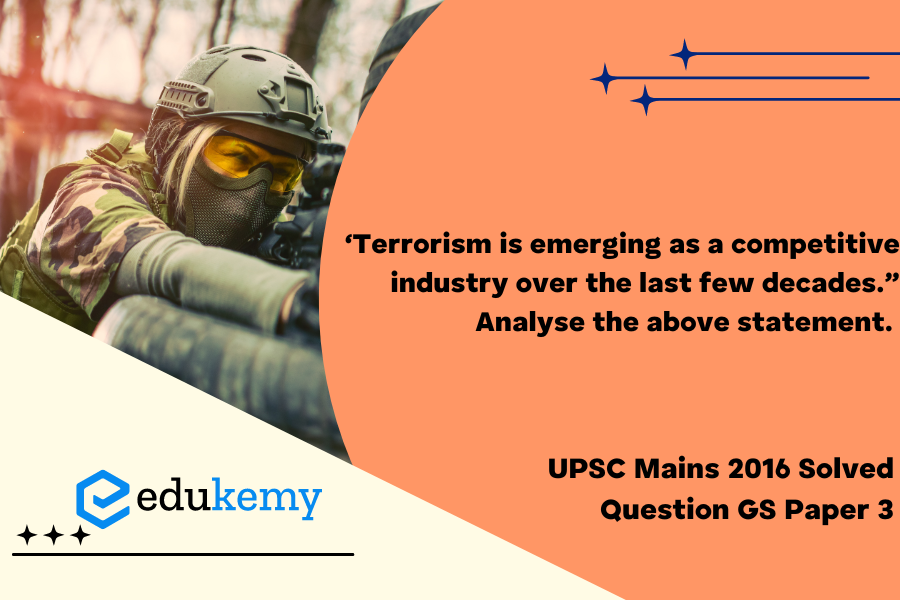Over the last few decades, the ominous specter of terrorism has evolved into what can be aptly described as a competitive industry. This stark assertion captures the multifaceted nature of modern terrorism, where various groups and actors vie for influence, resources, and notoriety on a global stage. The traditional perception of terrorism as a localized, isolated phenomenon has given way to a more interconnected and competitive landscape, reminiscent of a volatile industry. The emergence of diverse ideological motivations, coupled with the increasing accessibility of technology and global communication, has facilitated the proliferation of terrorist activities. This competitive dynamic is evident in the race among extremist factions to attract adherents, secure funding, and execute high-profile attacks that garner international attention. Furthermore, the rise of transnational networks and the diffusion of radical ideologies have contributed to a scenario where terrorist organizations compete not only for physical territory but also for the hearts and minds of individuals worldwide. In this analytical exploration, it becomes imperative to delve into the intricate interplay of geopolitical, socio-economic, and technological factors that have catalyzed the evolution of terrorism into a competitive industry, demanding a comprehensive understanding of the complex forces at play in this disconcerting global phenomenon.
Contents
Decoding the Question:
- In the Intro, try to start your answer by writing about terrorism.
- In Body,
- Discuss emerging trends in the working of terrorist outfits.
- Try to conclude with need to unite all to end its menace.
Answer:
Terrorism is the unlawful use of force or violence against persons or property to intimidate or coerce a government or its citizens to further certain political or social objectives. Law enforcement generally recognizes two types of terrorism: domestic and international. In recent years, with the emergence of new terrorist organizations like ISIS, Boko Haram, etc. terrorism has become a competitive industry. Like mafia organizations, where one-upmanship is often based on who has the most guns, money, or local power, terrorist groups to have a pecking order.

Growth of Terrorism as a Competitive Industry:
- Increasing number of terrorist out fits: Proliferation of numerous terror outfits spreading terror, akin to numerous industries producing the same goods.
- Competition for control over resources: There is competition over resources such as
- Land: ISIS and Taliban control large geographical areas in Syria and Iraq and Afghanistan, respectively.
- Labour: Recruitment of young people for carrying out terrorist activities and various logistics activities. Labour is also employed in opium production.
- Market competition: Competition for the market share and diversification of portfolio to include newer products (attacks) – from IEDs to vehicular bombs to suicide bombers and fidayeen-type attacks.
- Various franchise and support: Offices in different continents and franchising terror – Al Qaeda have its branches in the Indian Subcontinent (AQIS) as well as Africa (Al Qaeda in the Islamic Maghreb). Boko Haram, a Nigerian terror outfit, has pledged its allegiance to Islamic State (IS).
- Social media and marketing: Leveraging social media for marketing their ideologies and recruiting new employees (fighters) from social media by training professional recruiters.
- Employability: Industry provides wages, and accommodation and becomes a part of life for the worker. Terror outfits also provide these facilities and promote themselves as a new way of life.
- Innovation to stay afloat: Innovations like sleeper-cells, lone-wolf attacks, etc. are very hard to prevent.
Competition over establishing their ideologies all around the world has also instigated terrorist organizations for example multiple groups are fighting with each other in Syria. So in recent times, terrorism has become a competitive industry that has spread its influence all over the world.. The first step would be to arrive at a consensus recognizing terrorism as a threat to humanity and not a tool of geo-politics. Only when such consensus evolves co-ordinated effort to stop investment into such an industry can be stopped. The comprehensive convention on terrorism proposed by India at the UN is one such effective initiative.
In case you still have your doubts, contact us on 9811333901.
For UPSC Prelims Resources, Click here
For Daily Updates and Study Material:
Join our Telegram Channel – Edukemy for IAS
- 1. Learn through Videos – here
- 2. Be Exam Ready by Practicing Daily MCQs – here
- 3. Daily Newsletter – Get all your Current Affairs Covered – here
- 4. Mains Answer Writing Practice – here


